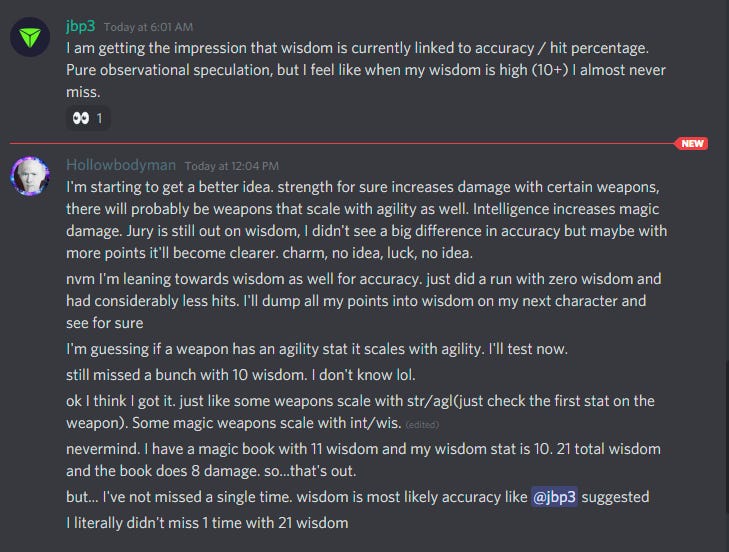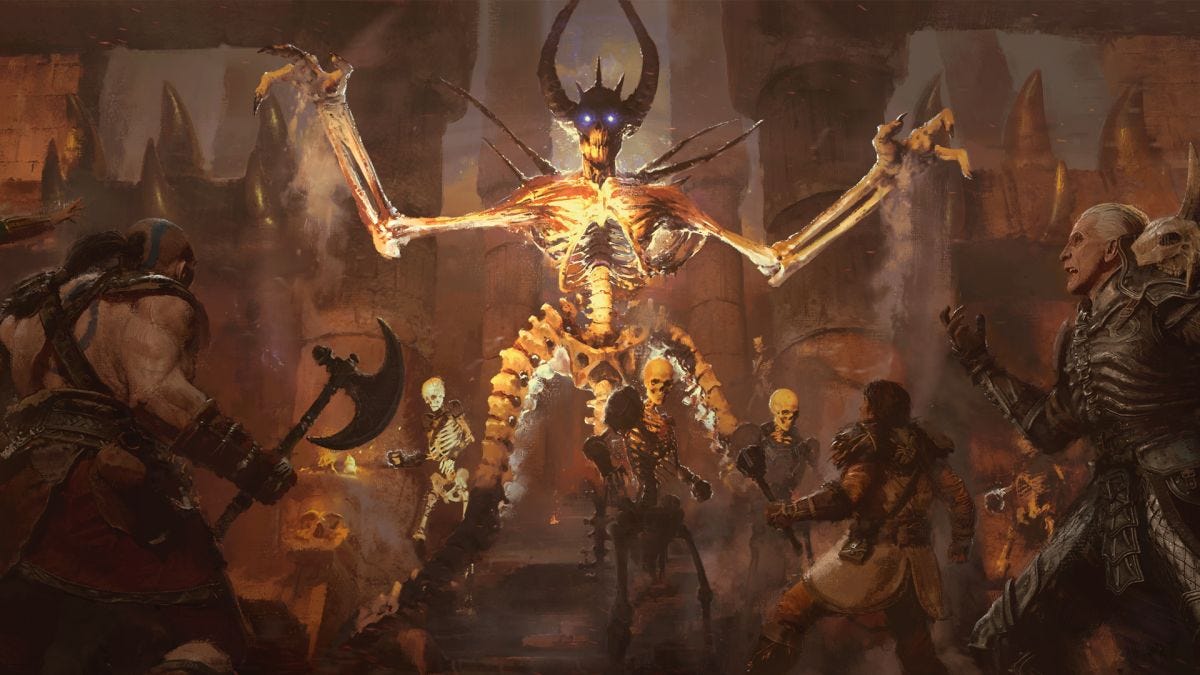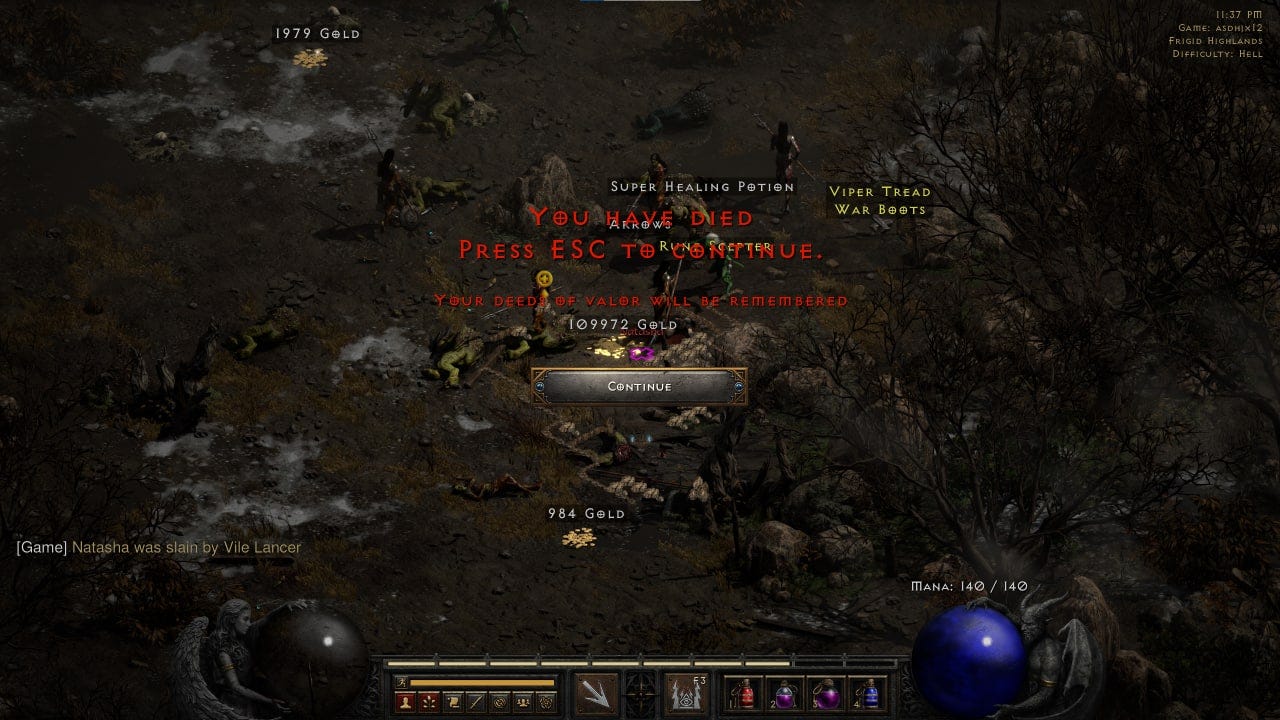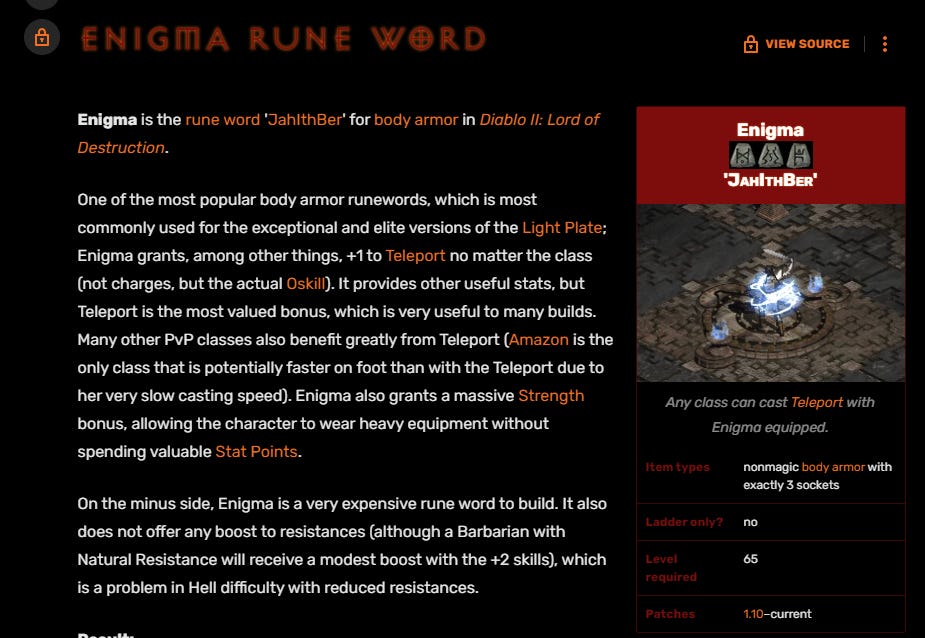Level 6: How Conflict & Friction Drives Gameplay: Learning, Digital Scarcity & Narrative
Using the blockchain to create conflict, friction, challenge, and adventure. Diablo 2 Resurrected, Leeroy Jenkins, and Star Atlas
Remember Jon Lai's Instant Games? Here's Hardcore Games.
If instant games are frictionless, hardcore games are full of friction -- and where friction lurks, opportunities arise.
Blockchain offers us a very real chance to begin, once again, making games that reward risk taking, and provide players, and developers chances at exultation, glory & triumph. How?
Conflict, friction, and digital scarcity.
In Praise of Friction: Diablo II Resurrected
I was playing Diablo II: Resurrected extensively over the Beta early access weekend in August. I haven't felt that genuine sense of progression in a game, in a while!
I levelled a Paladin through Act I and II (the only acts released) as a zealot. I hunted for a 2 socket sabre to make the runeword Steel with Tir and El.
I joined games, socialized and bartered for a Tal Rune to finish the Stealth runeword, changed to a Hammerdin, got player-killed by Blizzard Sorceresses (too many times), and witnessed a group of people go crazy over a 28% MF Nagelring.
This was just a ‘beta’ of the game — only 2 acts were available, out of 5. But the constraints made it so much more... interesting.
I felt joy developing a growing understanding of 'what Loot was valuable in this act1-2 metagame and what was not'. It was a new game where Loot was scarce, and trading opportunities were few and far between.
It was a dangerous game, where someone could come in and disrupt the tenuous group you've formed, running tombs-08.
Never had I paid attention to low level Runewords before -- by the time I was old enough to play Diablo 2 multiplayer (8 years old), I had people around me to ‘rush’ me (level me up quickly). I joined 'free' games, where people dropped unique loot for new players.
There was no d2jsp1, nor loot farming bots, nor auction houses to ease any of this friction. Players had to discover their own way. That’s its own form of fun.
Not every game has to have friction. And on balance, having less friction is great. I love that I can queue up for DotA 2 and join a game, with equally matched competitors, in 30 seconds. (But when I lose, it’s definitely unfair.)
Jokes aside, adding friction works in some video games -- really, it's what makes you remember. It generates stories, life lessons, and adventures. It emphasizes. It's what makes The Hunger (and the Squid) Games compelling.
It's the moments of tension in a video game that make it. It's dying over and over to the Butcher in Diablo. It's the corpse run across Tanaris after dying to a level-skull enemy. It's losing Sven Svensson (my first permadeath loss in RimWorld) to a raid. (Hardcore Games)
Edit 11/10/21: It’s losing your level 78 Assassin in Diablo II: Resurrected on Hardcore to Vile Lancers in Act 5 of Hell, just before you hit level 79, when you could equip the full Natalya’s set and get more resists. (Sigh.)
Games as Engines for Learning
Raph Koster, game designer of Ultima Online, suggested helpfully: games are opportunities for education: a chance to teach and to learn. You're learning new systems & models when you engage with a game, and you're flooded with dopamine for it. Above, I learnt not to underestimate ‘fodder monsters’ - Vile Lancers.
But oh, what a joy mastery can be! When you effortlessly execute a multi-pronged attack in Starcraft II, or when you coordinate a 378,012 USD battle in Eve Online, or successfully corner the early-expansion market on your World of Warcraft server... (s u p e r n o r m a l p r o f i t s)
I have confidence that blockchain will help bring and unlock the next era of scarce, dynamic gameplay: where players learn to negotiate amongst themselves, figure out crafting systems, engage in roleplay, sabotage, handle questions of land ownership. Some of the most ambitious games will even surface problems of logistics and managing the supply-chain.
These games will be the next generation of blockchain games. They will build full fledged virtual economies and systems, and introduce friction and conflicts of human values in order to create continually engaging gameplay.
In fact, Diablo 2: Resurrected is precisely this: where players wheel and deal on Discord, d2jsp and other sites.
d2JSP is an entire business that was built on settling item trades. There’s issues raised in the video above: items poofing, in-game economy, bots… that will give enough challenge to any prospective play-and-earn game designer.
As we know, blockchain helps mitigate items ‘poofing’ (as all items created are traceable). It also outsources all of that work of ‘trusting the other player to give you the money / forum gold’ onto smart contracts.
Cool, huh?
So yes, RE: the next generation of blockchain games: I have some idea of what games like that look like. Some of them will look like Diablo 2: giving players interesting choices.
“Players early on in the ladder can make a choice as to whether to give up their hard-earned items for more forum gold, when its more scarce, as opposed to later on when you’ll have to beg someone to take a Shako off your hands.” — Coooley, paraphrased
Ironically, it is friction that will provide players multiple roles in a play-and-earn economy, which are also player-driven economies.
If every stat is streamlined and comparable, then no one new will wish to play. (cf constant player complaints about classes feeling the same in WoW).
If everyone already knows what's the best thing to do in-game, there's no learning to be done.
Community Derives from Conflict and Friction
These days, I find myself wary of games that provide too quick and too easy a progression: selling everything upfront - legendaries. Star Cards2, and L60 boosts.3 Call it the shifting time preferences of gamers, sure.
But there’s a tradeoff. You see, when one gives everything away too easy, then no one in-game has a chance to accrue status for their skill and knowledge.
There's no time for a community to coalesce, for rivalries, wikis, guilds and friendships to form. People need to come together to solve SOME problem. Even if it is the problem of bashing down The Lich King, so they can get their loot already.
Perfectly Imperfect Information
In CryptoRaiders, the team made a decision to not release how statlines affect combat in their combat dungeon. Of course, how stats work is encoded in the game model… so that friction was a design choice.
Do you remember Game Wikis? Here’s what I get for googling “Diablo 2 Enigma”.
Someone did this. Some player set up a Wiki in order to make pages for every single runeword.
In an Instant World, you’d expect to be able to Google ‘how to do this’ and solve these problems.
But in a ‘Hardcore’ one, it’s your role, in the game, to go and figure it out. Share your victories and successes, which are valuable precisely because they are hard-won through your effort.
Now, you get to be on the ground floor and building up that repository of knowledge for other players, and your player model of the world.
That is your challenge, if you choose to accept it.

Your reward? Status, a sense of accomplishment, and the sense of contributing to a community larger than oneself.
And when one achieves things too easily, one doesn't cherish it too much.
The central criticism of Madseason is that Activision Blizzard has failed to ‘put gameplay first’. Engagement drives revenue & not the other way around.
This is the critical role of game designers & game economy designers: to ensure that a game remains viable to play, over, and over and over again, and to manage the expectations of a community, who has faithfully supported the game for years.
To develop systems that players find compelling, meaningful, that are cohesive and coherent with the intended world, and finally, to introduce new, lifechanging concepts to people along the way. (No pressure!)
Imagine: 10 years from now, a whole generation will have grown up learning about true digital ownership from games like Axie Infinity and Star Atlas.
When that generation plays similar games, they won't want anything less from their economies. The frictionless world offered us infinite land, and infinite resources. Digital scarcity via the blockchain has a potential to restore that friction to games — with limited amounts of resources, that players can fight over — conflict.
Conflict as a Driver of Emotion and Narrative
Conflict drives emotion, and the reason why players play a game is to feel an emotion. Conflict drives narrative, too.
“Yeah mate, I was like, flying my attack ship, the Ogrika Thripid, and I like had these like 20 fellow co-pilots around me, when we got ambushed by like a capital ship dude.
But like I had a person on the inside of their capital ship, lol so I knew they were coming so it was actually like a reverse ambush. So we boarded their capital ship and totally jacked it lol. We split the 30k winnings amongst the 20 of us easy earnings. Best raid ever. He threatened us over voice and then I killed his pilots lol” - some 15 year old kid playing Star Atlas in the future, probably.
Alright Chums up, let’s do this.
There’s your conflict of human values: “Life vs death. Victory vs defeat. Love vs hate. Have vs not have.”4 These are the dominant values in games today.
I hope Star Atlas with its proposed high-risk, high-reward gameplay & territory mechanics, will be a shining example of that when they launch, and help the next generation come up with similar epic stories.
At bottom, a game is a work of art -- a system that a developer designs, and hands off to the players. So, please, make a beautiful artwork that brings people joy as it unfolds. I'd love to play it. Just remember to bring your community on the upside of that ride too.
In closing, I'd like to share a piece I wrote back in 2019, pontificating on Hardcore Games and the 'weight', and subsequent satisfaction, of difficult video games. (https://ryanfoo.com/hardcore-games/)
Post Script: It’s Dangerous to Go Alone, bring some PALS FOR LIFE
I’ve recently joined KERNEL KB4, and we’re taking on the adventure of investigating Play-and-Earn games and developing principles for designing them (well).
Here’s a signal boost to the people I think are doing great work in this space:

Michael Martin released an awesome newsletter (CryptoGameBites), written in a punchy, digestable style that will keep you informed, updated and ready to rock with blockchain games.
Arianna Simpson appeared on Bankless and spoke on crypto-gaming, and how its going to be the ‘unlock’ that ushers in many, many more users of crypto.
If you’re working on a play-and-earn game, or trying to puzzle some things out about this space, I’m happy to chat with you. Reach out to me on Twitter: @0xRyze
A Diablo 2 items trading site, where players use Forum Gold as an intermediary currency.
Star Wars BattleFront.
Instant Boost in WoW: Burning Crusade.
https://www.gamedeveloper.com/design/human-values-in-game-design---an-approach-for-designing-emergent-storytelling





